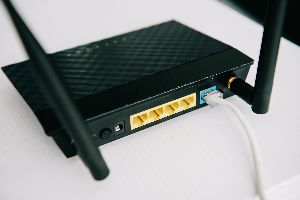3 Common Types of Wi-Fi Connections

In today's world, many people with a high-speed internet connection at home have their devices linked via Wi-Fi. Generally speaking, this means they have a router that's wirelessly transmitting the signal to a device, like a computer, game console, or tablet. However, that method depends on the type of connection. All Wi-Fi devices operate on a connection signal known as "802.11." However, the specifics of that signal have changed over the years, which is noted by a series of letters after that number. If those signals aren't compatible with the router and device, they can’t communicate.
What Are the Different Wi-Fi Connection Types?
1. 802.11b
Created in 1999, just two years after the standards were established, 802.11b operated on a 2.4GHz band that could run speeds as fast as 11Mbps. Although it's by no means considered "high-speed internet," at the time, being online without a physical Ethernet link to a router was impressive on its own. This connection, however, is no longer used by most devices.
2. 802.11ac

Released in 2014, this connection dramatically improved internet speeds. Now, it could reach 1300Mbps, getting people closer to high-speed internet. Most devices, such as computers, gaming consoles, and mobile devices, have the 802.11ac standard set up today. It also operates on a 5GHz band, which gives it a broader signal range.
3. 802.11ax
Moving forward, this connection will become the standard. It's predicted to be as fast as 10Gbps, which is significantly faster. It's about a 30% to 40% increase in speeds. This will support much more activity, so if you have many smart devices at home, this will ensure everything runs smoothly.
If you're having issues with your connection, Union Springs Telephone Co. can help. For nearly 70 years, they've been the trusted communications provider for Alabama's Bullock County. Known for their reliability and customer service, you can always trust you'll speak to someone directly whenever you contact them. They'll help you figure out whether it's an issue with your router or if it's time to upgrade. You can see what high-speed internet plans they offer on their website, but if you have any questions, don't hesitate to call them at (334) 738-4400.
About the Business
Have a question? Ask the experts!
Send your question

